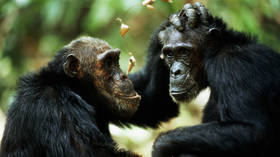Chimps do what we thought only humans could, study reveals

A team of researchers from Osnabruck University in Germany claim to have observed a behavior in chimpanzees that was previously thought to be specific to humans: giving each other medical assistance. The findings were reported in the journal Current Biology on Monday.
Many species of animals are known to engage in self-medication, by doing things like eating medicinal plants when they become ill. However, treating others’ ailments was long thought to be something that only we humans do. The group of researchers, who study a colony of chimpanzees at the Ozouga Chimpanzee Project in Gabon’s Loango National Park, say our species is not that unique after all.
The apes demonstrated on many occasions the same approach to fresh open injuries. They would catch an insect and rub it into the wound before removing the bug. The team saw over 20 such cases over a period of more than one year between 2019 and 2021.
In four of those sessions, the apes cooperated to apply the treatment. Two of the instances involved an adult female named Suzee, who used insects on her adolescent son’s injury.
In this clip, filmed by @alessandra_masc, you see the adult #chimpanzee#female Suzee, catching and applying an #insect to the open #wound on the foot of her adolescent #son, Sia. pic.twitter.com/JTLryXw0ac
— Ozougachimps (@ozougachimps) February 7, 2022
In another case, a female was grooming around an injury on the calf of another chimp named Littlegrey. She caught an insect and handed it over to the male, who rubbed it on the wound surface. In a fourth case, an adult male applied an insect to another injury that Littlegrey had.
Paper co-author Simone Pika, who is a cognitive biologist, believes the observations clearly point to chimpanzees having prosocial behaviors, meaning they exert efforts that benefit others but not themselves.
“For me, being interested in the cognitive skills of chimpanzees, it was particularly striking to witness that individuals not only treat their own but also the wounds of other non-related individuals,” she said.
We observed that individuals of our #Rekambo#chimpanzee community catch and apply flying #insects onto their own open #wounds. Filmed by @alessandra_masc. pic.twitter.com/Uu1k3RmMdB
— Ozougachimps (@ozougachimps) February 7, 2022
Humans developed traits like empathy that incentivize them to care for each other even when it doesn’t directly benefit the survival of their genes. The scientific community is divided over whether other species act based on empathy, and the German researchers hope their discovery will “add another facet to the ongoing debate.”
The team’s next plan is to attempt to identify what kinds of insects chimpanzees catch to apply to injuries. They would then conduct a study to check if they actually have healing properties.
Some bugs that humans have been using for treatments were proven to work in clinical trials, so finding that the same is true for the apes wouldn’t be a surprise. But if not, it would mean chimps have another thing in common with humans: quack medicines.












